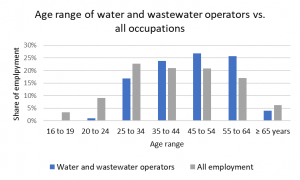Daniel Willems is a fellow in the 2019 Leaders in Environment and Finance (LEAF) program. As part of the LEAF Fellowship, Daniel worked with Envirolink over the summer of 2019. Daniel is a second year Masters candidate in the Department of City and Regional Planning at UNC. He currently works at the EFC as a Research Assistant on a water and wastewater regionalization project.
Across the country, communities are dealing with a shortage of water and wastewater treatment plant operators. This shortage – largely due to retirements occurring in an aging workforce – is leaving many municipalities in need of immediate replacements or short-term transition plans. Without qualified individuals to ensure state and federal standards are met for our drinking water and our wastewater, communities run the risk of failing to provide an essential public health service to their residents and local businesses.
Small, rural towns are particularly at risk. Many of these municipalities rely on operators to be far more than just operators. Small water system operators are often the system record keepers and have extensive system knowledge that may not be written or stored anywhere but in their own minds. A sudden retirement, illness, or extended leave has the potential to significantly impair system operations.
I learned about the importance of skilled operators and the issues that may arise when they are not present this summer as an EFC Leaders in Environment and Finance (LEAF) Fellow at Envirolink, a private utility management company. Envirolink operates under a managerial capacity sharing model, which is a public-private regionalization solution. Below are three possible solutions I evaluated to forestall and alleviate the consequences of an impending operator shortage.
Regional Operator Agreements
Regionalization is the talk of the town in the water and wastewater industry. Although consolidating smaller systems together or linking them to a larger, healthier system can be an effective way of cutting costs and improving system performance, regionalization is not limited to physical interconnection. For small systems where consolidation is not feasible, sharing an operator among multiple public water and/or wastewater systems is one such non-physical regionalization solution. Regional operator agreements can spread the costs of the operator’s salary across multiple enterprise funds and may result in better retention as the systems could collectively offer a more competitive salary.
An operator sharing agreement is a viable option because most water and wastewater treatment plants do not need an operator on-site at all times. This is especially true with the ability to remotely monitor SCADA systems over the internet. Depending on the size and set-up of the plant, some operators are only required to be on-site a few times a week and just for a few hours at a time. Water and wastewater operators can operate multiple plants through their certification, but the visitation requirements do vary with system type and size, as shown in the chart below.

Minimum operator requirements for various types of water and wastewater treatment plants Source: NC DEQ Water and Wastewater Treatment Facility Operators General Policies
Public-Private Partnerships
Private companies can facilitate operator capacity sharing when arrangements between municipalities are not technically or politically feasible. Companies like Envirolink have a staff of operators with a wide range of certifications that can serve as the Operator in Responsible Charge (ORC) of most municipal treatment plants. Should a utility decide that it does not want to rely on a private company long term, they can train in-house employees to take on the ORC role while relying on outside operators to run their treatment plant(s) in the interim.
Contracts between public and private entities may help municipalities save money and protect public health by potentially reducing the number of notices of violation (NOVs) and fines, reducing employee compensation for which the utility is responsible, and decreasing the likelihood of ending up without an operator all together. Service partnerships with private companies like Envirolink have benefited small water and wastewater systems that unexpectedly lose an operator and need an emergency replacement, as service agreements are non-competitive and can be executed quickly. While crafting operator sharing agreements with other municipalities may drag on for months or years, partnerships with private companies can begin within weeks. This allows private companies to step in to address emergency situations, in addition to providing a more permanent solution.
Apprenticeships and Training Programs
Training a new generation of water and wastewater operators is the most viable long-term solution to address a rapidly aging workforce. According to 2018 Bureau of Labor Statistics data, only one percent of water and wastewater operators nationally are 24 years old or younger. With operator positions paying above average salaries nationally, especially for individuals with a high school diploma and no college degree, there is the potential to expand apprentice programs for high school graduates.

Source: Bureau of Labor Statistics, U.S. Department of Labor, 2018
While apprenticeship programs exist in some states, other states like North Carolina have no established program where future operators can get paid to learn on the job while attending community college classes, often for free. Through programs like Apprenticeship NC, recent high school graduates or adults looking for a new career can gain the experience needed to succeed in the operator field. However, creating apprenticeship programs will take coordination between municipalities and private companies in need of operators, the community college system, and the water and wastewater certification boards.
Benefits of an apprenticeship program include:
- Hands on training while receiving a salary
- Structured community college coursework, often fully paid for by state and federal programs
- Regular career advancement and corresponding wage increases
- Certification in a high demand field
What’s Next?
Although many systems are already aware of the impending operator shortage, it’s time for all municipalities and utilities to consider the future of their operator workforce. Technology will help alleviate some of workforce demands, but an influx of a new generation of operators is needed throughout the country. If trends continue and young people stay away from the water and wastewater operator profession, small systems will be particular vulnerable to the insecurities and increased costs associated with the shortage. Through open dialogue with neighboring utilities and private companies to discuss operator sharing agreements and the creation of workforce training programs, the current state and future of the water and wastewater operations can be secured.





In my opinion, the wages arent that competitive. Especially when you look at a state like Texas. Some wages are as low as 13 an hour and often max around 18 an hour. It doesnt makes sense to me personally. Its really hard to attract/keep new operators to a field that doesnt pay the true value of an operators skill. Secondly they should stream line each states requirment to be an operator that way the demand can be filled in a reasonable time. But it seems each state has different expectations and different titles for an operator: however our field at the end of the day has the same fundementals and building blocks on how to treat water. In addition to that they should acknowledge operators in canada for their knowledge and skill. It opens the work force and allows more operators to effortlessly shift to areas of demand. A lot of the schools in canada base their course material on EPA regulations and should be recognized that students graduating have the skills to run a system as well. That might be hard to do though since canada generally pays a top rate for water amd waste water operators. The scope of the work needs to be acknowledged with appropriat compensation.